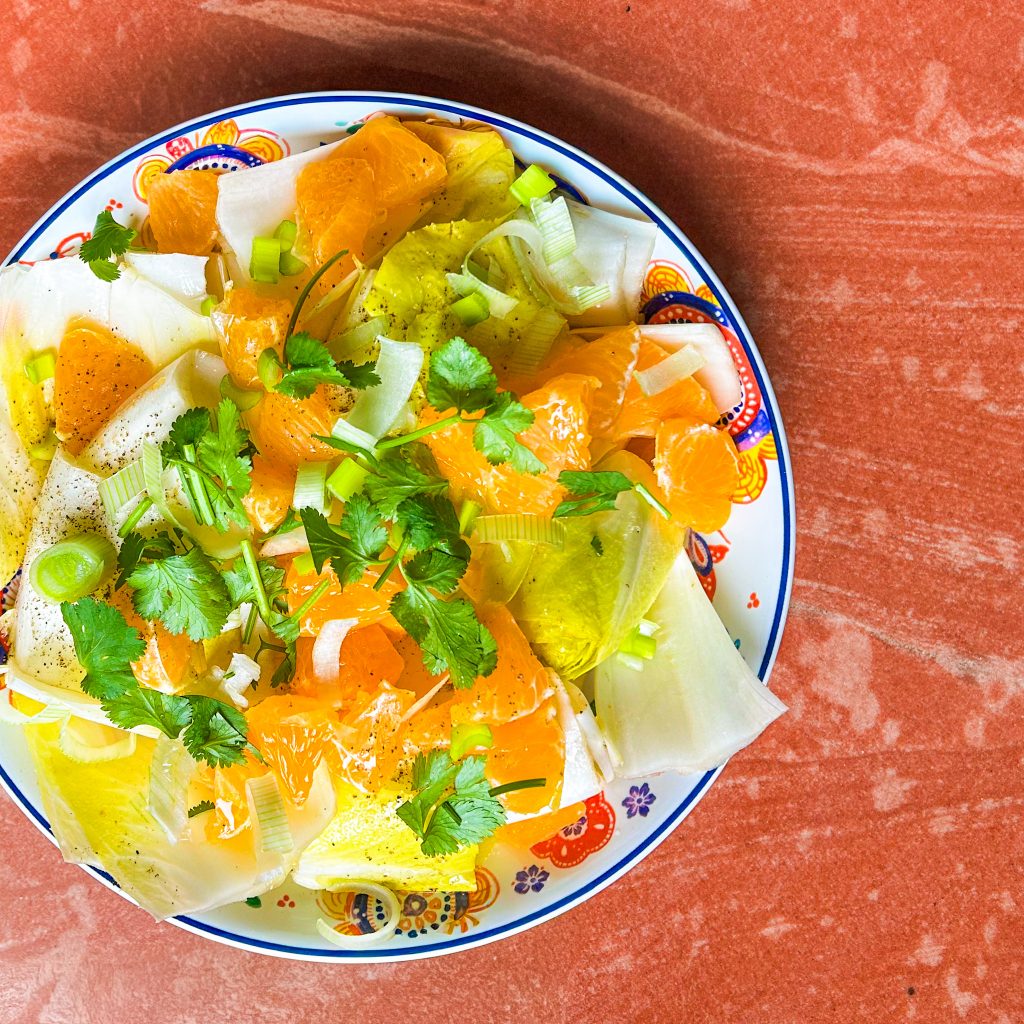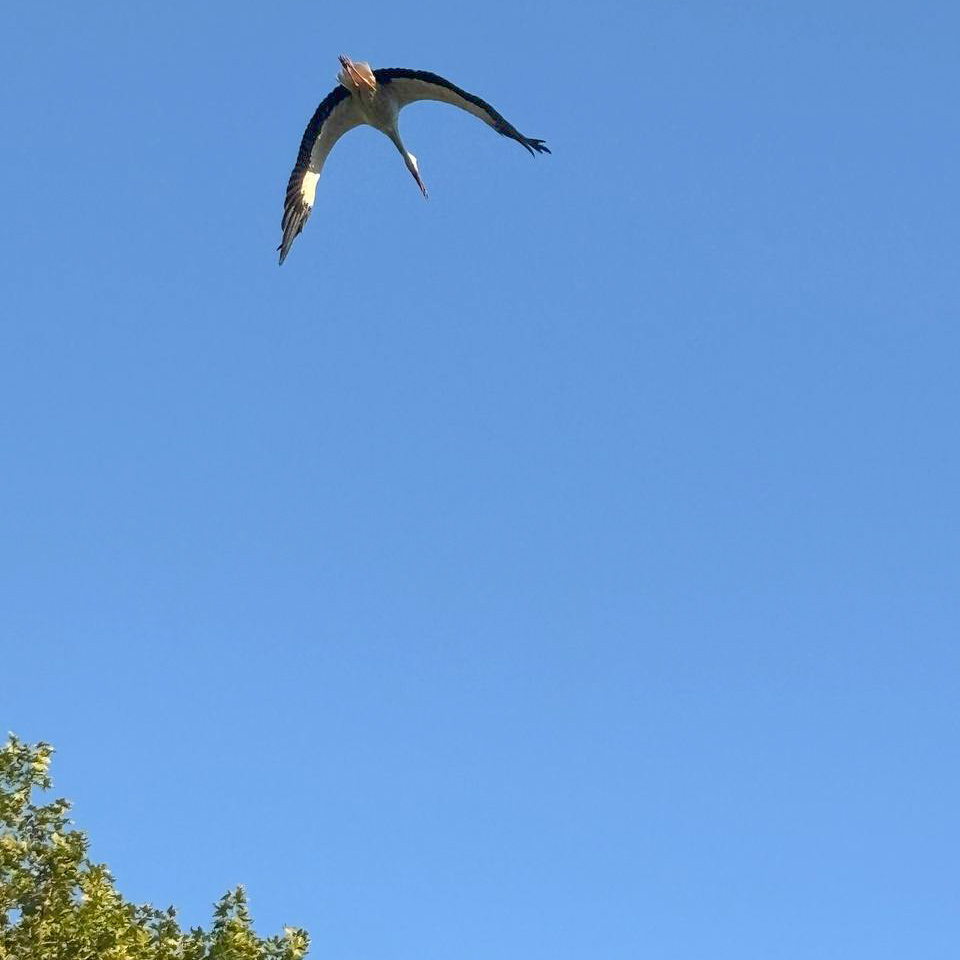-
Mandarin and chicory salad with date syrup, and wishing you a happy and healthy 2026

Mandarin and chicory salad The Chinese New Year starts with the new moon that appears between 21 January and 20 February. This year will be the Year of the Horse which sounds to me much more inspiring than ‘2026’. I would like to help you start off 2026 on a healthy footing (or hoofing perhaps), one that will support your energy, focus, and overall wellbeing during the year ahead.
My recommendations are never just quick fixes or extreme resolutions; they’re about building sustainable routines that fit your lifestyle and help you feel your best, both physically and mentally. Whether your goal is to improve nutrition, manage stress and fatigue, boost performance, or simply feel more balanced, guidance and accountability can make all the difference.
10% discount on consultations booked in January
To help you take that first step, I’m offering a 10% discount (use code 10JAN) on all Holistic Natural Health Consultations booked in January. This is my way of encouraging you to prioritise your health at the very beginning of the year, rather than putting it off for later. Consider it an investment in yourself and your future wellbeing.
So if this sounds like something you’d like to do, book a consultation here.
I made the date syrup with leftover dates from Christmas. Although dates are rich in sugar, they are also an excellent source of potassium, and other minerals and are also highly anti inflammatory.
Recipe for date syrup
- 500g dried pitted dates
- 1 litre water
Chop the dates, then soak in boiling water for 10 minutes to get rid of any impurities. Drain and discard the water. Place the soaked dates in a large pot with the litre of water and bring to a gentle boil. Cover the pot and leave to simmer for about two hours. Allow to cool and then sieve the mixture, preferably using a piece of cheesecloth. Make sure to squeeze all the water from the cooked dates. Pour the date juice into a pot and allow to come to a gentle simmer. Simmer uncovered for just under an hour until the excess water evaporates. Leave to cool; the syrup will thicken further once cold.
Date syrup can be used as a replacement for honey or maple syrup – on crepes, pancakes, yoghurts, ice cream, etc.
Recipe for chicory and mandarin salad
- 2 chicory
- 1 mandarin, peeled, segmented and halved
- 2 spring onions, sliced
- Fresh coriander, chopped
- 1 tablespoon date syrup
- 2 tablespoons sesame oil
- 1 tablespoon apple cider vinegar
- Sea salt
- Freshly ground black pepper
- Chinese 5 spice
- 1 clove garlic, crushed
Chop the chicory and place in a salad bowl, add the mandarin pieces, spring onions and coriander. Meanwhile whisk the date syrup, sesame oil, apple cider vinegar and seasoning together and pour over the salad.

Jojo, Océane, Bibi and Jazz -
Kickstart your health in September

The storks arrive On Saturday evening we were visited by scores of noisy storks, as they took a pitstop on their migration route. Storks fly from Alsace to Africa for the Winter, leaving France between the end of August and September. They hung out for about half an hour in the setting sun, on a couple of oak trees close to the house, seemingly unfazed by the chaotic dinner party taking place on the terrace beneath.

A pitstop in the oak tree While the storks migrate, September offers a natural opportunity to reset, refocus, and adjust our routines; the arrival of Autumn is a great time to implement changes that support physical, mental, and emotional wellness.
My written recommendations following a natural health consultation are obviously different for everybody, but there are few things that are fundamental for good health and vitality that I recommend to almost everyone, with very few exceptions.
Sunlight!
One of the most powerful, yet underrated, ways to optimise your health is to expose your eyes and skin to natural sunlight as soon as possible after waking. Morning sun anchors your circadian rhythm, helping to regulate sleep, hormone production, and mood.
Natural light in the morning tells the brain to reduce melatonin (the sleep hormone) and boost cortisol (in healthy amounts), which helps you feel alert and energized. Just 15 minutes of morning sunlight, ideally before 9am, can set the tone for your day and night. The morning light also assures that your body is primed to start producing melatonin later in the day, in preparation for sleep.
Avoid sunglasses and allow the light to enter your eyes indirectly (never look directly at the sun), and if possible, combine your morning light with gentle movement such as a walk, stretch, or breathing exercises. Stepping outside in the morning might be the simplest, cheapest yet most significant change you can make to get better sleep.
In northern latitudes, at this time of year, you don’t need sunscreen. In fact, at any time of year, you only need it if you’re going to be exposed at peak burning times. Too much sunscreen not only prevents the skin from producing vitamin D, it also disrupts the skin’s microbiome. I realise this is controversial, but don’t take my word for it, instead listen to what the dermatologist, Dr Véronique Bataille, has to say.
Replenish!
Mornings can be taxing on your adrenal glands, especially if your body is running on stress hormones. An adrenal cocktail, a simple blend of vitamin C, sodium, and potassium, can help nourish and support your adrenal health. This is my recipe. Failing that, a good electrolyte supplement will also do the job.
Move!
Move regularly throughout the day, and try to do some form of sustained exercise (at least 30 minutes) five or six times a week. This can be anything from walking, cycling, swimming to dancing, strength training, or yoga. Do whatever you enjoy and feels sustainable for you.
Frequent movement throughout the day helps improve circulation, reduce stiffness, and boost energy levels, especially if you spend long hours sitting. And regular sustained exercise strengthens the heart and lungs, improves muscle tone and flexibility, supports healthy weight management, and plays a crucial role in reducing the risk of chronic conditions.
Exercise also has great benefits for mental health; it reduces stress, anxiety, and symptoms of depression, while enhancing mood, focus, and sleep quality through the release of endorphins and other brain-boosting chemicals. Consistent movement and exercise are among the most effective and accessible ways to support both physical vitality and emotional well-being.
Eat!
One of the most important steps you can take for your health is to prioritise whole, unprocessed, nutrient-dense foods. While modern medicine has its place, many chronic conditions can be improved, sometimes even reversed, through dietary changes. Include some form of protein at all meals, especially breakfast. Focus on seasonal vegetables, wild-caught fish, grass-fed meat, organic fruit, and fermented food (kimchi, kefir and sauerkraut).
As obvious as this sounds, eat only when hungry! So often people reach for food as a crutch when they’re bored, tired, stressed or in need of comfort. And remember that you will only stop feeling hunger when you have satisfied your protein requirements.
Highly processed seed oils (rapeseed, corn, sunflower…) are inflammatory and contribute to oxidative stress in the body. Replace them with traditional fats such as extra virgin olive oil, butter or ghee, coconut oil and duck fat.
The Mediterranean diet, rich in healthy fats along with vegetables, legumes, nuts, fish, and herbs, is one of the most researched and beneficial dietary patterns. It supports heart health, cognitive function, and longevity. Your diet doesn’t have to be perfect, but you should really move away from ultra-processed and industrial foods.
Breathe!
The way you breathe directly affects your nervous system. Mouth breathing contributes to stress, poor sleep and dental issues. Nasal breathing, on the other hand, supports proper oxygenation, nitric oxide production, and nervous system regulation. Aim to breath slowly through your nose, with your lips sealed. Methods such as box breathing, alternate nostril breathing, or mouth taping can help retrain your breathing. See the Buteyko Method.
Relate!
Loneliness is as detrimental to health as smoking. Humans are wired for connection, so try to establish meaningful connections with people who uplift, challenge, and inspire you. Make time for proper conversation, shared meals, acts of kindness… Health isn’t just about what you eat or how you move, but also how supported and seen you feel.
Banish!
Just as some people feed your soul, others drain it. Emotional vampires (people who constantly criticise, manipulate, or demand) can sabotage your mental and physical health.
Make a conscious effort to distance yourself from toxic dynamics by setting boundaries, reducing contact, and prioritising people who respect and support you.Avoid!
If sunlight is your friend in the morning, then darkness is your healer at night. Exposure to artificial blue light from screens (phones, TVs, laptops) in the evening suppresses melatonin production and interferes with your body’s ability to wind down and subsequently sleep.
Ideally, aim to turn off screens at least 1–2 hours before bed. If that’s not practical, use blue light-blocking glasses or switch your ‘phone to ‘night shift’ to reduce blue light exposure.Sleep!
Try to be in bed before 11pm and aim for at least seven hours of sleep. It’s during sleep that your body repairs tissues, detoxifies, regulates hormones, and consolidates memory. The hours before midnight are especially restorative due to the natural circadian biology of melatonin and growth hormone production. Shortchanging sleep is like trying to run a race with no fuel; you may function, but you won’t thrive.
-
Naughty but knife at the airport, and reclaiming your health in midlife

The Gironde Estuary and Médoc vineyards I’m writing this from Bordeaux airport, where once again, my flight is delayed five hours due to technical problems. Get your act together BA!
My son, Léo, who always mocks me mercilessly for getting stopped by airport security (I fit the drug mule profile to a T), got his comeuppance today. The x-ray machine flagged a knife at the bottom of his computer case. It wasn’t an innocuous penknife either; it was a really heavy-duty ‘don’t mess with me’ sort of switchblade, the sort you would expect to come across in a dark alley at three in the morning. Security took him aside and asked him about it—interrogated him really—and he explained that he’d forgotten it was there, and that he mostly used it to trim the grapevines and slice his lunchtime chorizo sausage! They confiscated the knife and let him go, presumably having reached the conclusion that a potential terrorist probably wouldn’t spontaneously roll out the vine and chorizo excuse.
I exchanged my Mother of a Terrorist hat for my Natural Health Coach hat and had a conversation with Tamsin Jardinier of Unfolding Conversations, on the topic of reclaiming your health during midlife.
Tamsin offers whole-centered coaching to support high-achieving women, leaders, creatives, and entrepreneurs who are ready to reimagine life and work to create success on their own terms, and live a life they truly love.
-
Natural health coaching and consultations

Natural health coaching consultations Just under 20 years ago, I visited an endocrinologist because I was suffering terrible palpitations. He did some blood tests and, seeing that my thyroid, iron levels, etc were normal, prescribed beta blockers. He seemed extremely taken aback when I wanted to know the cause of the palpitations, instead of just accepting his ‘bandaid’. The beta blockers worked well, but I was concerned that it seemed as though I might be beta blockered for life; there had to be a reason – my heart hadn’t just made a unilateral decision to ‘rave’ 24/7.
After some research, and a visit to a naturopathic doctor, it turned out I was very deficient in magnesium. This also explained the terrible muscle and joint pain I had been having. It sometimes really is that simple. I happily replaced my beta blockers, muscle relaxants and ibuprofen with magnesium-rich food, and a good magnesium supplement and haven’t looked back.
From birth to eight months, my son, Léo, slept in stretches of about an hour, when he would wake up screaming. The local doctor said he was ‘capricious’, and was doing his best ironing board impression at hourly intervals throughout the night for fun. After numerous pitiful attempts, I eventually found a wonderfully understanding pediatrician, with a forensic attention to detail and a sympathetic ear, who immediately diagnosed silent reflux. She prescribed the necessary medication, as well as changes to his eating and sleeping arrangements. That night my ‘capricious’ baby slept for 12 hours straight.
The other doctors had missed this diagnosis because it was ‘silent’ (he wasn’t vomiting or even regurgitating). I returned to see the local doctor because I thought she might be interested to hear the conclusion, perhaps for other patients. She flat-out refused to believe he had silent reflux on the basis that if you can’t see it, touch it, or test it, it doesn’t exist. She had made her helpful diagnosis of ‘capricious’ and she was sticking to it.
We still visit the doctor from time-to-time and, as you will read here, I am eternally grateful for many aspects of modern medicine. We are mostly vaccinated, and take things like antibiotics or cortisone when necessary. But there is a time and place for everything, and these two experiences turned out to be salutary: I learnt that in order to stay healthy, I had to advocate, sometimes forcefully, for my family’s health.
I started to study naturopathy 15 years ago, and I am a certified Natural Health Consultant and Educator. A number of people have contacted me to ask whether I provide online consultations. Over the years I have been consulting on an informal basis, but I would now like to offer this to everyone that might be interested. Please see this page for further information.